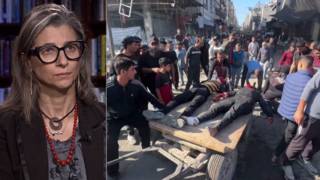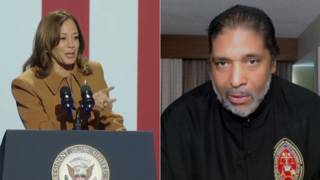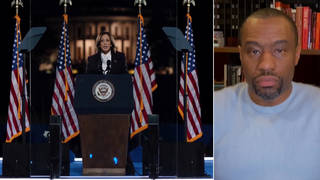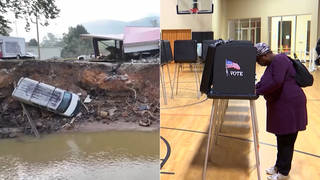
Related
Guests
- Marione Ingram87-year-old Holocaust survivor who has been protesting outside the White House calling for a ceasefire in Gaza.
Watch Part 2 of our interview with 87-year-old Holocaust survivor Marione Ingram, who has been protesting outside the White House calling for a ceasefire in Gaza. She describes her experience coming to the United States after World War II and getting involved in the civil rights movement, and how she was invited back to Germany, where she fled from, to address students about being critical of Israel amid fears of being called antisemitic.
Transcript
AMY GOODMAN: I want to go back to Marione Ingram, the 87-year-old Holocaust survivor from Germany, who’s been protesting outside the White House calling for a ceasefire in Gaza.
Marione, as a Holocaust survivor, you’ve been invited back to Germany, where you fled from, to address students. And you’ve expressed concerns that some Germans are reluctant to criticize Israel out of fears of being branded antisemitic. Can you talk about that and how you address not only young German students, but students in the United States, about the situation in Israel-Palestine right now?
MARIONE INGRAM: I have been for years going back and forth to Germany. And especially since the 7th of October, which I think all of us must agree was a horrific attempt at, you know, brutality, friends and students have asked me what they — you know, what they should do. And I tell them that to protest Israelis’ actions in Gaza, in the West Bank and generally, and for generations — this is not something that has just suddenly sprung up because Hamas attacked Israel and killed 1,400 people. It is a — I think it is our human right to be able to criticize. When I talk to them, I tell them, “I think you should criticize. And if people tell you that you’re an antisemite, tell them you’re not an antisemite. You’re protesting a government policy.”
I will give you an example. When Reagan was elected, he ran — he started his campaign, opened it, in Mississippi in the place where three of my colleagues, Chaney, Schwerner and Goodman, were murdered, and where the murderers were still running free, when I was in Mississippi running a Freedom School. The night before the election, I was with a friend of mine and her brother and two other people I did not know. And we were talking about the next day and the election, and I was suggesting that Reagan was not the person America should elect, that we were going the wrong way if we voted for Reagan. The next day, my friend called me and said, could she come over? She wanted to talk to me. And she came. I said, “Sure, come on over.” She came, and she said that I had no right to criticize America, because I was not American. My response was, “That is ridiculous. I can criticize any government in the world if I think that government is acting against human beings.” And I was so shocked by such a reaction, and I thought this actually supports what I feel about this coming presidency, if people actually feel that their right to criticize is aborted.
I am grateful to you, Amy, for having continuously shown what Israel is doing to Gaza. I do not — I am not an academician like Omar. I speak only for myself and my long years of watching. When I was a child, I did not understand the politics, but I understood the fear. And in 1943, I was the target of three nations: Germany, Britain and America. It achieved nothing. And one would have assumed that “never again” might actually, hopefully, mean never again. It has never meant that. It is an empty slogan that no government has adhered to. America is teetering, in my opinion, at the very edge of becoming Nazi Germany. Banning books leads to burning books. It leads to people being shut up. Like Omar, I have been described as a self-hating Jew. I have also been barred from speaking to some Jewish groups, because I talk about the condition of Palestinians.
I think that this slaughter going on now is a land grab. I think Israel will not be happy until they occupy all of Gaza. And they’re making inroads in that. They are also endangering themselves, because the brutality that they are showing can only reverberate and come back to haunt them in really terrible ways. I view Hamas not just as a Jewish — group of people who hate Jews. I view it also as an ideology. And ideologies cannot be murdered, no matter how many bombs you throw at them or how many people you kill.
I think we have to — we also always conflate things. Guterres of the U.N., the secretary-general, condemned the October 7th murder in Israel, but he also said it did not happen in a vacuum. I totally agree it did not happen in a vacuum. He is now attacked as antisemitic, or the Israeli representative to the U.N. is saying he has to resign. It is always people who are shouting, against Tlaib. It is so nonsensical. And it is done so that they can avoid really talking about issues.
I very early, early, early in Rabin’s administration, wrote to Rabin many, many letters about the brutality of Palestinian prisoners in Israeli prisons. I have been upset. When I went to Israel, I was so shocked by the inhumanity of Israel’s politics toward their neighbors, to fellow human beings, that I thought it is unconscionable.
Germany — from the atrocities that Germany committed, we should have learned something. Germany has learned from it. Germany is teaching it to children. They’re not saying children’s ears are not — you know, are too sensitive to know what has happened. In America now we are not teaching history. We are not teaching about the slavery, the slaughter of the Native population. All of this is washed under the table. You’re never going to learn if you do not look at history, if you do not look at it critically and openly.
And it is distressing to the max that I now feel safer as a Jew in Germany than I do as a Jew in America. The biggest attack that I experienced during my protest, that my husband and I — Daniel and I have been at the White House every single day, not just the big three demonstrations and the big march on Saturday. And on one of those occasions, just Daniel and I, an Israeli man, a tourist from Israel, young, strapping young man, his wife and their child looked at my sign, which is just a very simple “Survivor says peace, not war in my name.” And he attacked me and called me a Nazi. He called me a supporter of Hamas. He told me that I was in favor of killing Jews. And I tried to talk to him, and I said, “I’m not in favor of killing anybody. Quite the opposite, I want to stop the killing of all people.” And I felt so threatened and upset that I absented myself. So my husband said to him, “If you feel so passionate about these things, why aren’t you in the Israeli army?” And he responded by saying, “I have religious exemption.” And then Daniel said, “But you could volunteer.” And then he slinked off. And this is the kind of ridiculous thing. With my sign, walking toward the White House, a man shook his head and said I should be ashamed. Another man came by on another day and said, “I hate Jews.”
I’m against hate. I think hate makes a person bitter. It makes a person ugly. I think it’s wrong. I think you can hate the policies of governments, but you can’t hate the people, or you shouldn’t hate the people. So I feel sometimes like a lone voice in the wilderness. But I won’t give up. I’ll never give up. I’ll never give up fighting what I believe is just. I will never give up fighting for anything.
In the '60s, I organized in front of the NRA, which was then housed in Washington, D.C., with a bunch of children and their mothers, and I wanted to protest the killing of a neighbor and by a robber. I wanted to protest against guns. And the then-head of the NRA came out. There were representatives at that time of the major news organizations and the press. And the head of the NRA came out and asked who had organized it. And so I said, “I did. And we are here peacefully demonstrating, just us and our children.” And he said — and I'm going to have to quote him — he said, if I did not move them away, that he would blow our fucking heads off. And I thought that I had won my case. He had threatened to shoot us all. And I thought this would, you know, make all of the news organizations and the newspapers. And it was a total silence. Nobody even mentioned the fact that there was a protest. Nobody mentioned that I was threatened by the NRA.
These things are — I don’t want to be a cynic. I’m no longer optimistic, but I remain hopeful, because when I talk to young people and I see their enthusiasm and their willingness to love and their willingness not to hate, I’m encouraged.
AMY GOODMAN: Marione —
MARIONE INGRAM: And I feel — yes, sorry.
AMY GOODMAN: I wanted to ask you — Marione, you mentioned Schwerner, Chaney and Goodman. You were talking about Mickey Schwerner, James Chaney and Andrew Goodman, who were murdered in 1964 —
MARIONE INGRAM: Right.
AMY GOODMAN: — by the Klan in the South. Did you know them personally — Mickey Schwerner and Andrew Goodman, Jewish; James Chaney, African American?
MARIONE INGRAM: I have met them, but we were in different sections of Mississippi. So it was at some conference that I have met them. But I did not know them. No, I did not. But when I —
AMY GOODMAN: Well, you were in — if you could talk about how you organized in the South? I mean, here you were, a German Holocaust survivor. You came to this country. You were involved with an extended sit-in to support the Mississippi Freedom Party. If you could explain what that was, versus the Democratic Party, and why you did this, and the connections you saw to your resistance to fascism, whether it was in Germany or what you were seeing in the United States?
MARIONE INGRAM: This was — I organized for the local area of Washington, Maryland and D.C. — a sit-in on the boardwalk during the Johnson convention. And —
AMY GOODMAN: That was in Atlantic City?
MARIONE INGRAM: In Atlantic City on the boardwalk.
AMY GOODMAN: In New Jersey, during the Democratic National Convention.
MARIONE INGRAM: Convention, right. And it was around the clock during the entire convention, while my hero, Miss Hamer, was inside.
AMY GOODMAN: Fannie Lou Hamer, when she spoke —
MARIONE INGRAM: Yes.
AMY GOODMAN: — inside, talking about the —
MARIONE INGRAM: Yes.
AMY GOODMAN: — importance of an integrated Democratic Party?
MARIONE INGRAM: Right. And I, because I had organized things, I could not leave after the convention ended, and I was stranded in Atlantic City without means of getting back to D.C. And I was becoming a naturalized citizen the next day, and I needed to get back to D.C. so I could be become a citizen. And somebody said, “Try the Freedom Bus going back to Mississippi. Maybe you can get a seat on the bus.” Fannie Lou Hamer told me, when I went to the bus, that I was needed in Mississippi and that she thought that I needed to go and work in Mississippi. And she made her case so forcefully. I had a toddler, and my love was here. And I promised her that I would go to Mississippi the minute I became a citizen.
And the only reason I became a citizen was because I was often arrested, and because I have an accent, I was asked where I was from, and the risk of deportation was very strong. And so, I was urged. I did not want to become a citizen of any country. I’m anti-nationalism of all sorts. I also don’t rise to salute the flag.
And I went to Mississippi, despite the fact that, you know, my mother said that I should not go and that, you know, being at home was more important. And she called my husband, and he said, “I would break both my legs, if I thought that she would stay home, but I know she wouldn’t. You know, she believes that the fight for freedom is a fight for freedom for all.” And this is my belief. I do not distinguish the fight for Native Americans or the fight for Blacks or women’s rights. I’ve been at every gun protest, all the mass shootings. And it is so insane that we go on and doing things that we know is self-destructive and totally wrong. And in that regard, I guess I’m extremely opinionated. But I’m for all people.
This country has shocked me. It shocked me when I first arrived, because I believed the propaganda. It now shocks me that it has become so insanely unfocused, where lies are accepted, where criminality is accepted, or where people make sympathetic statements when there’s a mass shooting. When Reagan was — to me, Reagan’s election signaled in my mind the downfall of America, but I was hoping that the election after that would get rid of him. When it did not, Daniel and I sold everything we owned. We sold our house. We sold everything we owned, and we left the country. And we only came back to campaign for Obama.
AMY GOODMAN: Where did you live?
MARIONE INGRAM: We lived primarily in Italy in a part of Toscana that was not yet discovered by tourists. We rented a 16th century farmhouse for $100 a month. And for seven years, we lived on a tiny island off the western coast of Sicily, closer to North Africa than to the mainland of Italy. And I spent seven years — and we spent seven years in Hamburg, Germany, where I did research for The Hands of War.
I only wrote the book The Hands of War because of the War in Iraq. We were in Italy protesting at a march in Firenze, because they would talk about so many people killed and so many this and that murdered, and nobody ever mentioned the children. And children of war suffer. If they survive, they suffer.
I am a classic case of the things that cannot be unlived. I am now constantly thirsty because of PTSD and because Gazans don’t have water to drink. I have vomited when I drank water. I don’t sleep well. I can’t eat. This is, I guess, the classic PTSD. It comes up every time conditions in the world reach barbaric proportions. This time around, it is this remembrance has become extreme. And when I wrote the book, it was a plea for children. I wanted to write because I know what it’s like to be a child of war. And it cannot be unlived, no matter what — I’ve had such a fabulous and happy life. I have wonderful friends all over the world, and I am happy, but yet I have this other thing that comes up and that is not controllable. It just — it arises, and I’ve learned to live with it.
I have to also add to that that the civil rights movement helped me a great deal, because it allowed me to protest injustice. And that’s all I do, is I protest injustice. And I would like — since my birth, the world has been at war in one place or another, or Rwanda, people killing neighbors. In Sudan, people eating the same food, dressing the same way, they’re killing each other. So it is — Daniel, my beloved, says human beings are a failed species. I’ve fought with him about that, but I’m beginning to think that he may be right. But I don’t give — as I said, I’m not optimistic about the future. I fear for all of the young people who have to face insane governments and insane actions and the climate crisis and the gun violence in America and the violences in others. In Germany, I —
AMY GOODMAN: So, Marione, where do you get the most hope?
MARIONE INGRAM: Young people. Young people are my inspiration and my hope.
AMY GOODMAN: Well, Marione Ingram, I want to thank you so much for spending this time with us, and also want to wish you the very best as next week is your 88th birthday.
MARIONE INGRAM: On the 19th, yeah. Thank you so much for inviting me, Amy. It was very nice. I watch you every morning.
AMY GOODMAN: Well, now we got to watch you and to listen to you. Marione Ingram is a Holocaust survivor who has been protesting outside the White House calling for a ceasefire in Gaza. She’s the author of The Hands of War: A Tale of Endurance and Hope from a Survivor of the Holocaust and The Hands of Peace: A Holocaust Survivor’s Fight for Civil Rights in the American South. To see Part 1 of our interview, go to democracynow.org. I’m Amy Goodman. Thanks so much for joining us.












Media Options